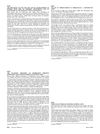 May 2016 in “American Academy of Pediatrics eBooks”
May 2016 in “American Academy of Pediatrics eBooks” Telogen effluvium is a condition that causes temporary hair loss.
 January 2014 in “Jaypee Brothers Medical Publishers (P) Ltd. eBooks”
January 2014 in “Jaypee Brothers Medical Publishers (P) Ltd. eBooks” Telogen effluvium is a condition that causes temporary hair loss due to stress or shock to the body.
 January 2013 in “Jaypee Brothers Medical Publishers (P) Ltd. eBooks”
January 2013 in “Jaypee Brothers Medical Publishers (P) Ltd. eBooks” Telogen effluvium is a condition that causes temporary hair loss.
[object Object] September 2012 in “Annals of saudi medicine/Annals of Saudi medicine” The twins' condition is unique and doesn't match any known syndromes.
April 2012 in “Informa Healthcare eBooks” Telogen effluvium is a condition that causes temporary hair loss.
 August 2011 in “SpringerReference”
August 2011 in “SpringerReference” Telogen effluvium is a condition that causes temporary hair loss.
 April 2008 in “Companion Animal”
April 2008 in “Companion Animal” The cat's skin condition was linked to cancer and did not improve with treatment, leading to a poor outcome.
 October 2005 in “CRC Press eBooks”
October 2005 in “CRC Press eBooks” Telogen effluvium is a condition where hair falls out due to various factors like illness, stress, or nutrient deficiency.
 March 2005 in “Journal of The American Academy of Dermatology”
March 2005 in “Journal of The American Academy of Dermatology” Mycophenolate mofetil improved skin condition in a man with nephrogenic fibrosing dermopathy.
 January 2004 in “Springer eBooks”
January 2004 in “Springer eBooks” Telogen effluvium is a condition that causes temporary hair loss.
 January 1998 in “Jaypee Brothers Medical Publishers (P) Ltd. eBooks”
January 1998 in “Jaypee Brothers Medical Publishers (P) Ltd. eBooks” Telogen effluvium is a condition that causes temporary hair loss due to stress or shock to the body.
 February 1994 in “Archives of Dermatology”
February 1994 in “Archives of Dermatology” Telogen effluvium is a condition that causes temporary hair loss.
 883 citations,
August 2016 in “Nature Reviews Disease Primers”
883 citations,
August 2016 in “Nature Reviews Disease Primers” Polycystic Ovary Syndrome (PCOS) is a common condition in women that can cause metabolic, reproductive, and psychological issues, and requires lifestyle changes and medication for management.
 421 citations,
April 2012 in “The New England Journal of Medicine”
421 citations,
April 2012 in “The New England Journal of Medicine” Alopecia Areata is an autoimmune condition causing hair loss with no cure and treatments that often don't work well.
 329 citations,
January 1997 in “Journal of the American Academy of Dermatology”
329 citations,
January 1997 in “Journal of the American Academy of Dermatology” Frontal fibrosing alopecia is a hair loss condition in postmenopausal women, similar to lichen planopilaris, with ineffective treatments.
 291 citations,
January 2014 in “The Scientific World Journal”
291 citations,
January 2014 in “The Scientific World Journal” Lichen Planus is a less common condition affecting skin and mucous membranes, with various types and associated risk factors, challenging to diagnose, significantly impacts life quality, and may have a risk of cancerous changes in oral lesions.
 290 citations,
December 2017 in “Journal of The American Academy of Dermatology”
290 citations,
December 2017 in “Journal of The American Academy of Dermatology” Alopecia areata is an autoimmune condition causing hair loss, influenced by genetics, stress, and diet, and may be prevented by a high soy oil diet.
 214 citations,
March 1993 in “Archives of Dermatology”
214 citations,
March 1993 in “Archives of Dermatology” Telogen effluvium is a reversible hair loss condition that requires a detailed diagnosis and often resolves on its own.
[object Object]  185 citations,
August 2005 in “Autoimmunity Reviews”
185 citations,
August 2005 in “Autoimmunity Reviews” Alopecia areata is an autoimmune condition causing hair loss due to the immune system attacking hair follicles, often influenced by genetics and stress.
 155 citations,
June 2009 in “International Journal of Dermatology”
155 citations,
June 2009 in “International Journal of Dermatology” Lichen planus is a skin condition that can resolve on its own, is linked to hepatitis C, and increases the risk of skin cancer.
 112 citations,
July 2008 in “Dermatologic Therapy”
112 citations,
July 2008 in “Dermatologic Therapy” Folliculitis decalvans is a rare scalp condition causing scarring hair loss, treated with long-term antibiotics and other medications, but it often comes back and is hard to manage.
 85 citations,
October 2012 in “Dermatologic Clinics”
85 citations,
October 2012 in “Dermatologic Clinics” Alopecia Areata is an autoimmune condition often starting before age 20, with varied treatment success and a need for personalized treatment plans.
78 citations,
June 1989 in “The Journal of dermatologic surgery and oncology” Acne keloidalis is a chronic skin condition on the back of the neck in young black men, needing surgery for severe cases.
 75 citations,
October 1996 in “Dermatologic Clinics”
75 citations,
October 1996 in “Dermatologic Clinics” Chronic Telogen Effluvium is a hair loss condition in middle-aged women that usually doesn't lead to complete baldness.
75 citations,
September 1985 in “Archives of dermatology” Two boys had a rare skin condition needing to be differentiated from similar disorders, with unclear inheritance due to few cases.
 74 citations,
September 1980 in “Medical Clinics of North America”
74 citations,
September 1980 in “Medical Clinics of North America” Toxic epidermal necrolysis is a severe skin condition often caused by drugs, with complex treatment and a high risk of death, but survivors usually heal without scars.
 72 citations,
July 2008 in “Dermatologic Therapy”
72 citations,
July 2008 in “Dermatologic Therapy” CCCA is a scarring hair loss condition mainly in African descent women, possibly caused by genetics and hairstyling, treated with gentle hair care and medications.
 66 citations,
January 2000 in “Dermatology”
66 citations,
January 2000 in “Dermatology” Dandruff is a common, winter-worsened scalp condition linked to inflammation and microorganisms, treatable with products like ketoconazole, and may affect hair loss.
56 citations,
September 2010 in “Veterinary pathology” Certain mouse strains develop a skin condition similar to a human hair loss disease due to genetic defects.
56 citations,
January 2004 in “Journal of the American Academy of Dermatology” Cyclosporine can cause a unique skin condition called "cyclosporine-induced folliculodystrophy."
























